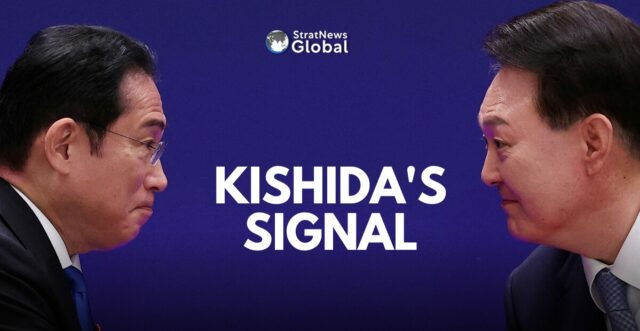Japan’s outgoing Prime Minister Kishida will meet South Korean President Yoon Suk Yeol for a final summit. This move signals support not only to South Korea but also to Kishida’s potential successors.
Encouraged by the U.S. President Biden, both leaders reversed deteriorating ties. Relations had worsened due to disputes over Japan’s 1910-1945 occupation of Korea.
Their new partnership faces challenges with Kishida’s departure and the upcoming U.S. presidential election. “Kishida may need to show that his efforts with Yoon were the right path,” said Tetsuo Kotani. Kotani is a senior fellow at the Japan Institute of International Affairs.
Setback Fears
As Kishida’s response to Yoon’s overtures had spurred pushback from Japan’s political right, his successor could face pressure from conservatives to take a harder line, Kotani added.
“We know that in the past, when Japan and Korea have found their way to rapprochement, political change has sometimes contributed to setbacks, or set the conditions for setbacks,” a senior U.S. administration official said.
“So while… our confidence is high in the future of our relationship with Japan and all of our multilateral engagements, Kishida’s step here is really important,” added the official, who sought anonymity in discussing diplomatic matters.
While few major announcements are expected from the summit, officials said they saw Kishida’s final visit to Seoul as crucial to U.S. efforts to present a unified front against challenges from neighbouring North Korea and China.
Kishida’s visit is not just a signal of support and thanks to Yoon, but also a message to the Japanese government and prime ministerial candidates that the partnership has to be a lasting part of Tokyo’s foreign policy, the U.S. official added.
Japan’s ruling Liberal Democratic Party will hold elections on Sept 27 to choose Kishida’s successor.
Mediator America
Last year U.S. President Joe Biden invited Yoon and Kishida to Camp David where the three leaders committed to deepen military and economic co-operation.
They also delivered their strongest joint condemnation yet of “dangerous and aggressive behaviour” by China in the disputed busy waterway of the South China Sea.
The Camp David initiatives were explicitly designed to prompt long-term partnership so that “no one of us would have an incentive to pull away from that deeper co-operation if political change did happen,” the U.S. official said.
Yoon has said the partnership will remain effective in part because of the diplomatic pacts both sides had adopted.
“There could always be some anxiety about the new prime minister, especially given the personal synergy between the two leaders,” said a senior South Korean government official who sought anonymity to discuss sensitive diplomatic matters.
“But the fundamentals of relations won’t change, and Kishida’s visit will reaffirm the significance of having good relations with Korea and could send a message to the incoming leader, whoever that might be.”
‘Strong Request’
Kishida made a “strong request” to see Yoon a final time before he leaves office, the South Korean official said.
The summit is expected to yield a memorandum of understanding on evacuating civilians from each other’s countries during emergencies in third countries, he added.
The South Koreans hope for conciliatory comments from Kishida about Koreans forced to work for Japan during its occupation, but even without these the visit could help to keep “shuttle diplomacy” on track, he said.
Tokyo wants to broaden ties to reach a “more dynamic phase”, a Japanese foreign ministry official told a briefing, without elaborating.
Bitter History
Yoon’s moves have not always been popular at home, where many believe Japan has not done enough to atone for its occupation, which included forced labour and other abuses.
Japan says the issues were resolved by a treaty that normalised relations in 1965, but some South Korean governments and court rulings have disputed that.
“From Japan’s point of view, the concern is about the continuity of South Korea’s foreign policy after the change of the current government in Seoul,” said Kim Hyoung-zhin, the South’s former ambassador to the European Union and NATO.
“You can say the same for Korea about the changes of government in Tokyo.”
(with inputs from Reuters)
















